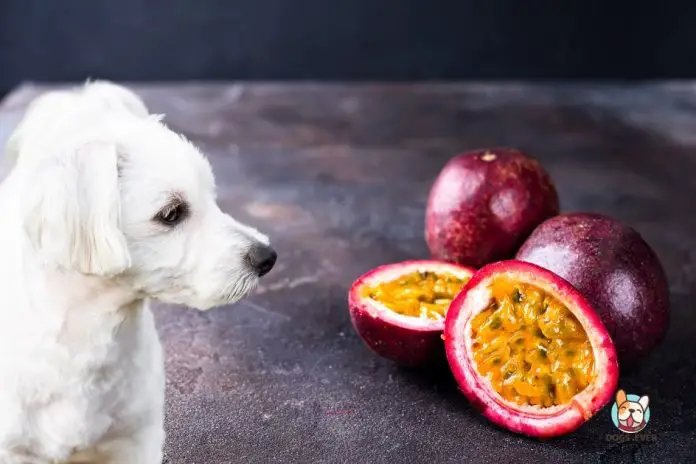The allure of passion fruit is undeniable, but when it comes to sharing this tropical delight with your furry friend, questions abound. Can dogs eat passion fruit without any concerns? In this exploration, we’ll uncover the nutritional benefits, potential risks, and the safest ways to offer passion fruit to your canine companion.
Can dogs eat passion fruit?
Yes, dogs can eat passion fruit, but it’s essential to remove the seeds and offer only the pulp in moderation.
Can dogs drink passion fruit juice?
While a small amount of plain passion fruit juice might be safe for some dogs, it’s best to consult your veterinarian to ensure it won’t cause digestive issues.
Can dogs eat passion fruit seeds?
No, dogs should not eat passion fruit seeds as they can pose a choking hazard and lead to digestive discomfort.
Can dogs eat dried passion fruit?
Dried passion fruit should be avoided for dogs as it’s often high in sugar and can lead to digestive issues.
Can dogs have frozen passion fruit?
Yes, dogs can have frozen passion fruit pulp as an occasional cool treat, but remember to remove the seeds and offer it in moderation.
Can dogs have passion fruit pulp?
Yes, dogs can have passion fruit pulp, but it should be served without seeds and in small, controlled portions.
Nutritional Benefits of Passion Fruit for Dogs
Passion fruit isn’t just a delightful tropical flavor; it’s also rich in essential nutrients, especially when ripe. Let’s explore the benefits of feeding passion fruit to your dog and how it can give your dog’s nutrition a boost:
Unveiling the Vitamins and Minerals in Passion Fruit
Passion fruit contain a treasure trove of vitamins A and C, which bolster your dog’s immune system and eye health. It also offers dietary fiber, promoting a healthy digestive tract.
Is passion fruit bad for dogs? Know the risks of cyanide poisoning
While passion fruit has its merits, there are certain considerations when it comes to your dog’s consumption.
Many believe that passion fruit is toxic to dogs, but that’s not true. It’s only the seeds that contain a compound, cyanide, which is highly toxic to dogs (and humans alike!)
Unraveling the Seeds and Digestive Concerns
Passion fruit seeds can pose a choking hazard for dogs, and the tough outer shell of the seeds may lead to digestive discomfort. Passionfruit seeds also contain cyanide, which is toxic to dogs, even in small portions.
We’ll discuss how to navigate these concerns.
Monitoring for Any Allergic Reactions
As with any new food, some dogs may be sensitive or allergic to passion fruit. It’s crucial to recognize and address these reactions promptly.
Safe Ways to Offer Passion Fruit to Dogs
If you decide to introduce passion fruit to your dog’s diet, it’s essential to do so responsibly.
Properly Preparing Passion Fruit for Your Pup
Always remove the seeds and serve only the pulp of the fruit. This ensures a safer and more enjoyable experience for your dog.
Serving Sizes and Moderation for a Fruity Indulgence
As with any treat, moderation is key. Passion fruit should be an occasional delight rather than a daily feast.
Signs of Passion Fruit-Related Allergies or Issues
It’s essential to be vigilant for any signs of adverse reactions in your dog.
Keep an eye out for symptoms such as vomiting, diarrhea, or skin irritations. If you notice any of these, consult your veterinarian promptly.
Alternatives to Passion Fruit for Your Dog
Passion fruit is not the best of all fruits for your dog, as it’s hard to remove absolutely all seeds from it. However, there are plenty of other dog-friendly options to consider.
Explore alternatives like blueberries, apples, bananas, cranberries, peaches, mango, pear, pineapple, raspberries, watermelon, or specially formulated dog treats designed to meet your pet’s nutritional needs.
Consulting with Your Veterinarian
Before introducing passion fruit or any new food into your dog’s diet, consulting your veterinarian is a prudent step. They can provide tailored advice based on your dog’s health, dietary requirements, and specific concerns.
Conclusion
In conclusion, the question of whether dogs can eat passion fruit has a tropical twist. While passion fruit offers valuable nutrients, the potential risks associated with seeds and allergies must be considered. By following safe practices, you can treat your dog to this exotic fruit responsibly.
FAQs (Frequently Asked Questions)
Can all dogs safely eat passion fruit?
While many dogs can enjoy passion fruit in moderation, some may be allergic or sensitive to it. Monitor your dog’s response.
How should I introduce passion fruit into my dog’s diet?
Begin with small amounts and watch for any adverse reactions. Gradually increase the quantity if your dog tolerates it well.
What do I do if my dog shows signs of passion fruit allergies?
If you suspect an allergic reaction, discontinue passion fruit and consult your veterinarian for guidance.
Are passion fruit vines or leaves safe for dogs?
It’s best to stick to the fruit pulp and avoid offering passion fruit vines or leaves to your dog, as they may not be safe for consumption.


